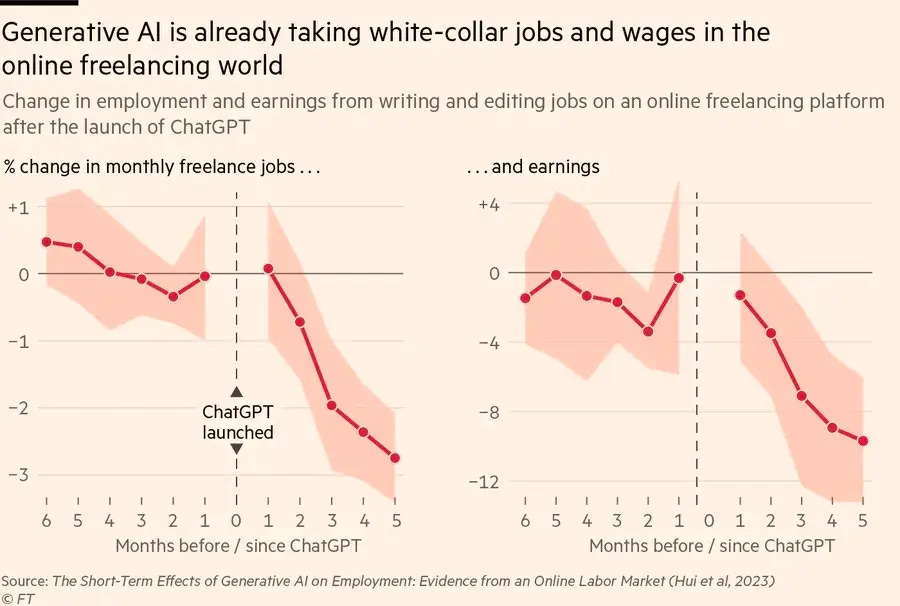Early Tremors: Assessing Generative AI's Emerging Impact on Jobs and Incomes
This article examines an early study analyzing how the release of AI writing tool ChatGPT impacted freelance writers on Fiverr.
In the summer of 1999, the Economist published a special report on “The Net Imperative.” It led with a bold prediction from Andy Grove, Intel’s chairman:
“In five years, all companies will be Internet companies, or they won't be companies at all.”
Fast forward two decades, and there’s a new technological transformation afoot. Only this time, instead of networks and bandwidth, it’s artificial intelligence driving change. And that same question looms: is AI about to reshape every company and institution?
From retail to banking, healthcare to transportation, the ripples of machine learning and language models like ChatGPT are already visible. But perhaps no sector illustrates this tidal shift better in these early days than at the heart of the digital economy: freelance work. These independent creators, sellers of skills and talent to the highest bidder, find themselves at ground zero of AI’s automation potential.
The Arrival of Writing AI: ChatGPT Debuts and Disrupts
In a new study, researchers Xiang Hui from Washington University in St. Louis and Oren Reshef and Luofeng Zhou from New York University set out to analyze one slice of the economy being reshaped by AI: online freelance work.
They focused specifically on Fiverr, an online marketplace boasting millions of freelance service providers that has become a barometer for the gig economy. Writers make up one of the largest segments on Fiverr, with writing and translation among the most sought-after offerings. So, the researchers zoomed in on outcomes for 92,547 writers before and after the launch of ChatGPT in November 2022.
In the days after ChatGPT launched, the supply of writing jobs available to Upwork freelancers shrank by 2%. At the same time, the average monthly income potential for writers slipped by a more noticeable 5.2% compared to pre-AI levels. Beyond these broader impacts across the market, AI began changing individual activity as well. In the first month after ChatGPT emerged, writers took on 4.7% fewer jobs compared to what they handled pre-AI. Additionally, writers faced a 1.2% lower chance of getting hired at all for any given month—a 15% increase in the probability a writer would have zero income for the month.
While these early effects represent more of a tremor than an earthquake for freelance writers, the researchers categorized them as “economically meaningful.” The shifts foreshadow how emerging AI could disrupt freelancing livelihoods as the technology matures.
Adaptation Over Automation: Lessons from Machine Translation's Evolution
But, the initial data only reveals ChatGPT's short-term impact. In reality, Fiverr writers will likely adapt rather than vainly compete against the technology. Just as translators evolved to embrace machine translation, writers will transform their offerings by productively working alongside AI tools like ChatGPT.
Despite widespread predictions that automation would make human translators obsolete, two key developments disrupted that narrative. First, specialty areas like legal translation still require advanced human expertise where accuracy is paramount. Second, hybrid "Machine Translation Post-Editing" services emerged, with AI generating an initial draft for humans to perfect. This synthesis reshaped rather than eliminated roles while expanding access and unlocking demand. The number of professional American translators and interpreters grew 19% between 2010 and 2021, even as machine translation advanced.
The data shows ChatGPT's immediate impact, but history suggests writers and other freelancers will creatively evolve to thrive alongside the technology rather than be extinguished.
See More:



